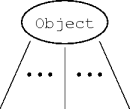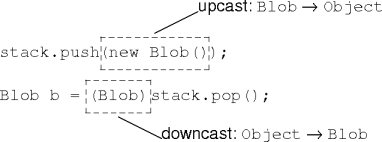Object-Oriented Programming with Java Lecture Notes
19 February 2009 • Polymorphism
Outline
|

|
Protocol Classes
- Classes defining protocols may have unusual properties.
- Most unusual: methods without implementations.
- They’re declared for their signature and for documentation.
class Dictionary void add(Key k, Value v) { } Value find(Key k) { } void delete(Key k) { }
Abstract Methods
- Needlessly implementing protocol-class methods can be a pain.
- It’s not hard, but it may be confusing.
class Dictionary void add(Key k, Value v) { } - Protocol-class methods can also be implemented.
- It’s not hard, but it may be confusing.
- Abstract methods eliminate this unbearable tedium.
- An abstract method has no implementation.
Abstract-Method Example
- Abstract methods are tagged with the abstract keyword.
abstract void add(Key k, Value v); abstract void delete(Key k); abstract Value find(Key k);
Another Protocol-Class Property
- Should protocol classes with abstract methods be instantiated?
- What happens when calling an abstract method?
Dictionary d = new Dictionary(); d.find("hello") // ???
- What happens when calling an abstract method?
- Variables of protocol-class type do make sense.
- Thanks to is-a type compatibility.
Dictionary d = new HashTableDictionary();
- Thanks to is-a type compatibility.
Abstract Class
- An abstract class defines abstract methods.
- An abstract class cannot be instantiated (a compile-time error).
- An abstract class is tagged with
abstract.- Even though it has abstract methods.
abstract class Dictionary abstract void add(Key k, Value v); // and so on.
- Even though it has abstract methods.
Abstract-Class Methods
- An abstract class may define implemented methods.
- The usual way of sharing code with children.
- This can be dangerous design, easily abused.
- An abstract class with no abstract methods still can’t be instantiated.
Abstract Classes and Inheritance
- A child of an abstract class inherits as normal.
- Both the abstract and defined methods.
- The abstract method tag is inherited.
- A child becomes an abstract class if it fails to override a
parent’s abstract method.
- The child must be declared an abstract class.
- The child may add both defined and abstract methods.
Abstract-Class Types
- Prefer abstract classes as types over non-abstract ancestor classes.
- Abstract-class types preserve flexibility and control complexity.
- Implementation changing flexibility.
- Focusing on essential details defined by the protocol.
- The trade-off is loss of control over the implementation details.
Abstract Type Example
- Changing implementation is easy.
HashTableDictionary d = new HashTableDictionary();
- Changing implementation is much harder.
- Variable and parameter types have to be rewritten.
- Calling
HashTableDictionary-specific methods is even worse.
Dictionary d = new HashTableDictionary();
The Object Class
- The Object class is the only class without a parent.
- Every class has Object as an ancestor.
- Either explicitly or implicitly.
class Blob extends Object { ... } class Spot { ... } class Drop extends Spot { ... }

- Either explicitly or implicitly.
Object Polymorphism
- Because every class is-an Object, Object provides a simple form of
polymorphism.
class Stack void push(Object o) { ... } Object pop() { ... }- This is a stack that can hold any class instance.
- And primitives via autoboxing.
- This is a stack that can hold any class instance.
- What is the implicit protocol in this polymorphism?
Casting
- Object polymorphism requires up- and downcasting.

- Incessent downcasting makes Object polymorphism tedious and dangerous.
- The compiler handles the upcasting.
Object-Casting Problems
- Indiscriminate object casting is confusing and dangerous.
stack.push("blah"); use(stack); stack.push(new Blob()); use(stack); stack.push(stack); use(stack); - What does
use()look like?void use(Stack s) ??? e = (???) s.pop(); // and so on.
Generics
- Java 5 replaces Object polymorphism with generics.
- Actually, it automates the downcasting in Object polymorphism.
- Confusion and failures in generics are a consequence of this.
- Java versions prior to 5 had only Object polymorphism.
- Object polymorphism also exists in various corners of post-1.4 Java.
Object Methods
- Object implements several important methods:
public boolean equals(Object o) public int hashCode() public String toString() protected Object clone()
- Class designers should think about overriding these methods.
- And others, depending on the child class.
- Visit the Object JavaDoc page and see!
Equality
- When are two class instances equal?
- There are at least two interpretatons: two instances are equal if they
- are the same instance (identity), or
- represent similar values (similarity).
- Identity involves form and is syntatic; similarity involves content and is semantic.
- Identity implies similarity, but not vice versa.
Identity vs. Simularity
- Equality as identity:

- Equality as similarity:

- The class designer has a choice between equality as similarity or equality as identity.
Object.equals()
-
Object.equals()implements identity:public boolean equals(Object o) return this == o
- Identity is fast, but is usually too strict for equality.
StringBuffer sb1 = new StringBuffer("woof"), sb2 = new StringBuffer("woof"); if (sb1.equals(sb2)) // Identically false, // but usually should be true.
Equality Contract
- Every
equals()implementation should satisfy the equality contract.- Other general methods have contracts too.
- Failure to satisfy the equality contract can lead to failures, some obscure.
- Inspecting a system’s
equals()implementations is quick way to estimate development quality.
Contract Rules
- Every implementation of
equals()should be- Symmetric:
x.equals(x)is always true. - Reflexive: if
x.equals(y)theny.equals(x). - Transitive: If
x.equals(y)andy.equals(z), thenx.equals(z). - Null-rejecting:
x.equals(null)is always false. - Consistent: If
xandydon’t change, thenx.equals(y)doesn’t either.
- Symmetric:
Equality Example
public boolean
equals(Object o)
if this == o // reflexive
return true
if o == null // null rejecting
return false;
if getClass() != o.getClass()
return false
final Card c = (Card) o
return
c.suit == suit &&
c.rank == rank
Equality vs. Inheritance
- Establishing equality among indirectly related class instances can be tricky.
- The test
if getClass() != o.getClass() return false
can be too strong and may need to be weakened to
if !(o instanceof class) return false
Equality Example.
- Consider 2D points.
class Point int x, y
- What should
Point.equals()mean?- Identity: maybe, if the points are interned.
- Similarity: maybe, if “close enough” points are equal, or points aren't interned.
Equality Example..
- Consider colored 2D points.
class ColoredPoint extends Point Color color
- What should
ColoredPoint.equals()mean?- Does it mean the same thing as
Point.equals()? - That is, do colors matter?
- Does it mean the same thing as
Equality Example...
- Suppose colors don't matter.
class coloredPoint // Standard method lookup // equals() could be dropped. public boolean equals(Object o) return super.equals(o) - If points are interned, colored points have to be interned too.
Equality Example....
- Suppose colors matter.
class coloredPoint public boolean equals(Object o) return super.equals(o) && color.equals( ((coloredPoint) o).color) - If colored points are interned, do colors have to be interned too?
Equality Example.....
- If colors matter, then points and colored points are incomparable.
- Both
cp1.equals(p1)andp1.equals(cp1)fail becausegetClass() == o.getClass()
fails.
- Is that reasonable? Shouldn't
coloredPoint(1, 2, Color.RED)equalpoint(1, 2)?
Equality Example......
- Colors matter, but points and colored points are comparable.
- Both
cp1.equals(p1)andp1.equals(cp1)fail becausegetClass() == o.getClass()
fails.
- Is that reasonable? Shouldn't
coloredPoint(1, 2, Color.RED)equalpoint(1, 2)?
Object.hashCode()
-
o.hashCode()returns aninthash code foro. - The
hashCode()contract:- If
x.equals(y), then
x.hashCode() == y.hashCode().
- If
- Overriding
equals()requires overridinghashCode().- And the override must satisfy the
hashCode()contract.
- And the override must satisfy the
hashCode() Example
-
Object.hashCode()returns a hash code based on instance address. -
Object.hashCode()doesn’t obey thehashCode()property with respect toCard.equals(). (Why?)class Card private int rank; // 1 to 13 private char suit; // c, d, h, or s int hashCode() return rank + suit;
Object.toString()
- The instance method
String toString()returns a printable representation ofthis. - Override
toString()for significant classes.employeeName.toString()→
"EmployeeName@1cd2e5f", not so good.
employeeName.toString()→
"George Leroy Tirebiter", better.
Summary
- Polymorphism is your exploitable friend.
- Unfortunately implemented with the chain-saw of inheritance.
- Abstract classes are one way of defining protocol classes.
- The Object class provides a week form of polymorphism.
- And several subclass responsibilities.
Credits
- Plato by Yuxuan.fishy.Wang, under an AT NC ND Creative-Commons license.
